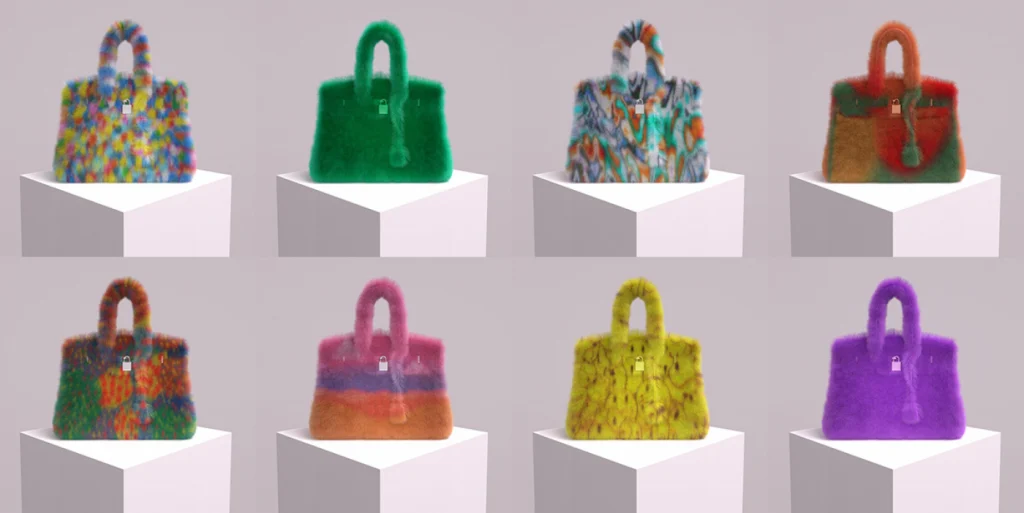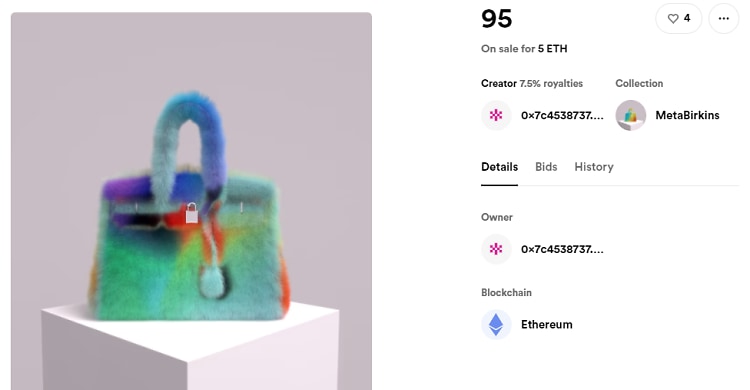Hermès’ Wins Permanent Injunction in MetaBirkins Lawsuit
The court has sided with Hermès in the latest round of the trademark infringement and dilution lawsuit that it waged over the sale of the MetaBirkins non-fungible tokens (“NFTs”). On the heels of a favorable jury verdict for Hermès in February, Judge Jed Rakoff of the U.S. District Court for the Southern District of New York denied MetaBirkins creator Mason Rothschild (“real name: Sonny Estival”)’s request for a judgment of law in his favor – or alternatively, a new trial – and granted Hermès’ petition for a permanent injunction, which bars Rothschild from continuing to market the Birkin artwork-linked NFTs and using the MetaBirkins domain, among other things.
Setting the stage in an opinion and order on Friday, Judge Rakoff stated that after a 9-day trial, an 8-person civil jury returned a unanimous verdict, finding Rothschild liable on all three trademark claims and awarding Hermès $133,000 in damages. “As the jury expressly found, Rothschild, a self-described ‘marketing strategist,’ purposely sought (with some success) to confuse consumers into believing that his [MetaBirkins] NFTs and associated metabirkins.com website were affiliated with Hermès’ iconic ‘Birkin’ trademarks.”
And while the jury was instructed that “even the modest elements of artistic expression contained in Rothschild’s works entitled him to total First Amendment protection against Hermès’ claims unless Hermès proved that Rothschild intentionally misled consumers into believing that Hermès was backing its products,” the court stated that the jury “had no difficulty in concluding that Hermès had so proved.” Judge Rakoff further noted that “in effect,” the jury – almost certainly swayed by the evidence produced by Hermès about Rothschild’s desire to “cash in on the Birkin name” – found that Rothschild “was simply a swindler.”

With the background out of the way (a full timeline of the case can here found here), the court delved into the post-trial motions that the parties filed following the jury’s verdict, namely: Rothschild’s motion for a judgment of law or new trial and Hermès’ petition for a permanent injunction.
Judgment as a Matter of Law – First considering Rothschild’s bid for a judgment as a matter of law or a new trial, which rest, in part, on his arguments over the instructions provided to the jury, the court held that the structure of the instructions was proper, as was the substance.
Permanent Injunction – Turning to Hermès’ motion for a permanent injunction to stop him from “continu[ing] to promote the sale” of the MetaBirkins NFTs on social media and listing them for sale on different NFT marketplaces, “while also seeking to collect a royalty for these sales,” the court found that Hermès satisfied the four requirements for an injunction set forth by the Supreme Court in eBay Inc. v. MercExchange.
Those four factors required Hermès to show that: “(1) it has suffered an irreparable injury; (2) remedies available at law, such as monetary damages, are inadequate to compensate for that injury; (3) a remedy in equity is warranted, considering the balance of hardships between [it] and [Rothschild]; and (4) the public interest would not be disserved by a permanent injunction.”
At a high level, the court held that …
(1) Hermès is entitled to “a rebuttable presumption of irreparable harm” by virtue of the jury verdict in its favor on its trademark infringement claim. (The court shut down Rothschild’s primary here that the Trademark Modernization Act presumption only shifts the “burden of production” to him, and that since he met that burden, the “burden of persuasion” shifts to Hermès.)
(2) “The undisputed evidence that Rothschild has continued to promote sales of the MetaBirkins NFTs on social media platforms and to execute sales on a cryptocurrency platform is dispositive of this eBay element,” per Judge Rakoff. As such, “monetary relief … would not fully compensate Hermès for the ongoing harms it has suffered by Rothschild’s continued use of its trademarks.”
(3) “Because the court already found that Hermès would suffer irreparable harm absent injunctive relief, it need only evaluate the weight of Rothschild’s hardships to complete the analysis,” Judge Rakoff held.
On this front, Rothschild argued that an order enjoining him and anyone who purchased a MetaBirkins NFT from selling or marketing the NFTs would “eviscerate [their] prospective First Amendment right to promote and [sell their] … artworks in a way that does not explicitly mislead as to their source.” In particular, Rothschild asserted that “a blanket prohibition” on his and others’ use of Hermès’ trademarks in connection with “these works of art” – in ways that are not explicitly misleading, such as offering the NFTs for resale with a disclaimer (more about disclaimers here) – “violates [their] First Amendment right to free expression.” He also claimed that if the court were to go further and order him to transfer the NFTs’ “smart contracts” to Hermès, its injunction would “destroy the property rights of bona fide, good faith purchasers of [the NFTs] who are not parties to this case.”
The court rejected these arguments, stating that they are “at odds with the jury’s determination that Hermès proved that Rothschild had intentionally waived his First Amendment protection under Rogers” by “label[ing] and design[ing] his NFTs in the way that he did – that is, through use of Hermès’ marks – intending to exploit the goodwill and reputation of Hermès.” Rothshcild’s arguments are also at odds with “Second Circuit caselaw on equitable remedies in the trademark context.”
(4) “The public has an interest – one that is embodied in the Lanham Act – ‘in not being confused’ about the origin of an artwork, as much as it does with respect to a consumer product,” the court held.
Unclean Hands, Bad Faith – Having failed to prevail on any of four eBay factors, Rothschild pushed back against Hermès’ bid for a permanent injunction by arguing that Hermès’ “bad faith” and “dishonest” conduct bars any such relief. Unpersuaded, the court found that this “unclean hands” argument is “entirely meritless,” given that it found “no evidence whatsoever of bad faith on Hermès’ part, let alone the kind of egregious conduct found in the foregoing cases.” Indeed, the court said that “Rothschild’s claims of Hermès’ bad faith [are] unsupported by any persuasive evidence.”
Scope of the Injunction – As for what the injunction awarded to Hermès actually consists of …
(1) Given the likelihood that the continued sale and marketing of the MetaBirkins NFTs will generate confusion as to source among the public, the enjoined Rothschild and any “other persons who are in active concert or participation with him” from further infringement, including the collection of any royalties from the NFTs that have already been purchased.
(2) In light of the jury’s determination that Rothschild was liable for cyber-squatting, the court ordered Rothschild to transfer the www.metabirkins.com domain name and related materials to Hermès. As of the time of publication, the metabirkins.com domain had been deactivated. (As for the relevant @metabirkins social media handles, the court is not requiring them to be transferred to Hermès. However, the order bars Rothschild from “registering, using, or trafficking any domain names or social media or NFT platform usernames or handles that use and/or incorporate the ‘MetaBirkins’ mark.”)
(3) The Court ordered Rothschild to disgorge any profits he derived from the MetaBirkins NFTs since the beginning of trial to the present day, which includes royalties, transfer income, or other financial benefits that he received from resales of the NFTs. Accordingly, by June 30, Rothschild has to specify in writing any royalties, transfer income, or financial benefits that he has earned from the MetaBirkins NFTs from January 31, 2023 through June 30, and shall transfer those earnings to Hermès by no later than July 15.
(4) Rothschild must “communicate the details of the court’s order for a permanent injunction to purchasers of the NFTs and others,” including by airdropping to all “MetaBirkins” NFTs holders a copy of the injunction order.

Despite Hermès’ push for Rothschild to be required to transfer any MetaBirkins NFTs in his possession, including the smart contract, to Hermès, the court refused to order him to do so. The court held that “because the MetaBirkins NFTs are at least in some respects works of art,” it has, “of an abundance of caution, [chosen] to enter a narrower injunction that would remedy continued consumer confusion while avoiding any potential constitutional problems.”
Request to Interview the Jury – The court refused Rothschild’s request to interview the jury’s foreperson, and “up to four other … jurors” because of “the substantial possibility that the jurors considered material, prejudicial and erroneous information outside the record in reaching their verdict.” Refusing what it calls Rothschild’s “most frivolous” motion, the court said that these are “serious accusations” waged by Rothschild, and yet, they were “made without the slightest support.”
TLDR: The Court denied both of the Rothschild’s motions and entered a permanent injunction barring him from further marketing and/or offering up the MetaBirkins NFTs, among other things.
THE BIGGER PICTURE: This is certainly another win for Hermès, and while Rothschild may not get to keep the cash he generated from the MetaBirkins NFTs or make further gains from the MetaBirkins project, such as by collecting royalties from secondary market sales, it is difficult not to suspect that he already reaped at least some of the benefits of the infringing MetaBirkins NFTs regardless of the outcome of the case. It is worth noting, of course, that Rothschild signed by major Hollywood talent agency, CAA, a deal that was likely driven at least in part by the success of the MetaBirkins. Moreover, Rothschild has likely been able to use the media coverage of the MetaBirkins project (including a recent 8-page profile from Vanity Fair France) to his advantage and parlayed some of that attention to boost other projects.
The case is Hermès International, et al. v. Mason Rothschild, 1:22-cv-00384 (SDNY).